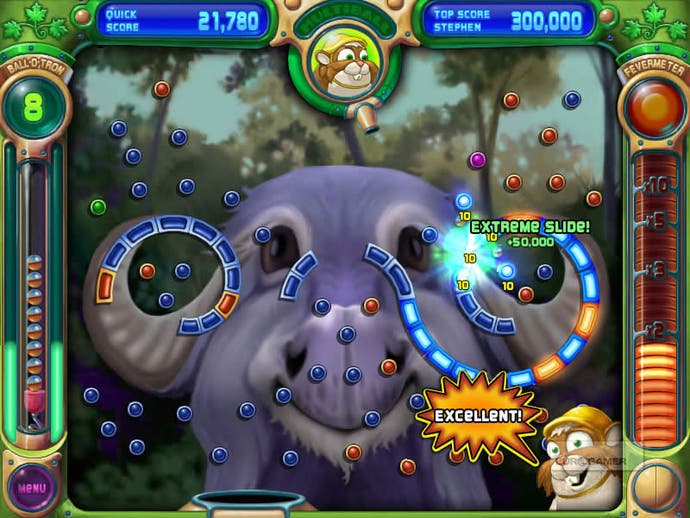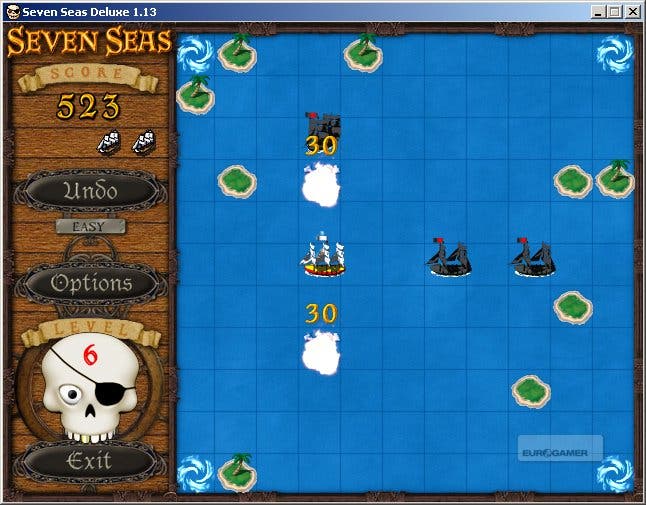Inside PopCap Games
Sexy Action Cool.
Rebranding inevitably followed, as PopCap moved on from Java games to "deluxe" downloadable titles, practically inventing the "try-before-you-buy" casual market in the process. Some labelled the studio as a clone manufacturer - true at first perhaps - but that missed the skill with which the company's games came together, the fact that they were often simply better than any of the competition's, even if they weren't necessarily that different fundamentally. Today, the PopCap effect is unmistakable, coming on like a descent into a warm bubble bath, soothing and familiar - a combination of simple mechanics gently deconstructed until they feel like second nature, and a lush, colourful presentation riddled with positive feedback and unexpected jokes.
Still working out of the founders' apartments until 2002, games like Bejeweled and Peggle have seen the developer grow from three people to around 200 in the intervening years, with offices in Shanghai, Dublin, Vancouver, Chicago and San Francisco. So a lot's changed since the early days, but the company's unique approach to development has remained consistent. Despite its growing bulk, and the fact that its releases are increasingly seen as triple-A titles in their own right, each of the studio's games is generally built by a small team - often composed of just three core members - iterating furiously over a long period of development. Plants vs. Zombies took three years to make, Bejeweled Twist took closer to four.

Kapalka, who will admit, when prodded, that the extent of Plants vs. Zombies' success with more traditional gamers was "a little bit" surprising, is aware that the lengthy development cycles may make it hard for the company to capitalise quickly on surprise smashes. "It's tough," he muses, "because you want to learn from things, but at the same time, if you're a year or two into production on something, you may not want to change it around. A hit certainly informs things going forward, when we start a new project, though."
Speaking of going forward, it's tempting to read Plants as a subtle change in direction - it's one of the studio's most elaborate games so far, featuring a surprisingly dense ecology of units and towers. Is the studio starting to outgrow its 'casual' niche? "We're starting to see a little change," says Kapalka. "I think we're more willing to try some fairly radical ideas now. Not in everything - there will still be Bejeweled sequels and that sort of thing - but outside of those franchises, we're willing to do more adventurous ideas."
But Kapalka also suggests that the market is changing along with PopCap. "A lot of the casual games space has changed quite a bit," he argues. "I'm reluctant to say it's become more sophisticated, but there's some of that, and there's also more of a crossover from the hardcore into that space."
In short, the casual market is starting to get a lot more complex, and PopCap's games are starting to reveal the divisions. "Plants sells well on Steam, Bejeweled doesn't sell as well. Peggle sells well on Steam, but is only mediocre on some of the other portals like Big Fish," admits Kapalka. "It does kind of raise the question, is the audience segmenting? You could argue that the traditional casual PC market that we started in has stratified into a Hidden Object-dominated space; to some extent that's true and we do some stuff in that area, but it's hard to innovate there. At the same time, there's these markets like iPhone and Steam, and there's a different audience there. It's definitely interesting to see where you can go with that, because that's an audience that's new, still undefined, and growing, whereas the Hidden Object market is certainly stable, but I'm not sure it's growing. It's predictable, and it's not particularly responsive to radical shifts."

All of which could make PopCap's job a bit more difficult in the years ahead - but Kapalka feels the studio is in a good position to cope with any changes. "A lot of people who came up with us, doing casual games on the web, are still doing that, and that only. We've diversified a lot, sometimes by choice, sometimes just by luck. Our revenue is now split across a lot of difference sources, and that hopefully gives us a lot more perspective. If you're doing a bit of Facebook, a bit of retail, a bit of iPhone, I hope it gives you a bigger picture, a chance to see what's tough and what's becoming promising. There are some sectors that will get tougher: downloadable price points are going down, iPhone's getting overcrowded. You have to be careful with that." He pauses, and considers his words. "And it means the kind of games you felt you had to do five years ago, some sort of match-three puzzle game, now feel a little too simplistic. That may be a little incorrect, but it does feel now that that might not be what the best path might be."








